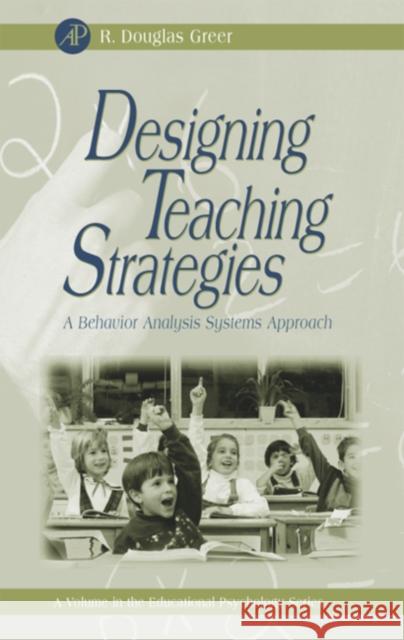Designing Teaching Strategies: An Applied Behavior Analysis Systems Approach » książka
topmenu
Designing Teaching Strategies: An Applied Behavior Analysis Systems Approach
ISBN-13: 9780123008503 / Angielski / Twarda / 2002 / 363 str.
The US Dept. of Education, in conjunction with the US Dept. of Health and Human Services, recently unveiled a $50 million effort to expand research on early childhood cognitive development. A key issue identified requiring more information and research was the education and professional development of educators. Along these lines, Doug Greer has prepared a book discussing how best to teach, how to design functional curricula, and how to support teachers in using state-of-the-art science instruction materials.
The book provides important information both to trainers of future teachers, current teachers, and to supervisors and policy makers in education. To trainers there is information on how to motivate, mentor, and instruct in-service teachers to use the best scientifically based teaching strategies and tactics. To in-service teachers, there is information on how to provide individualized instruction in classrooms with multiple learning and behavior problems, school interventions to help prevent vandalism and truancy, and how curricula and instruction can be designed to teach functional repetoirs rather than inert ideas. To policy makers and supervisors, the book discusses how to determine the effectiveness of curricular innitiatives toward meeting mandated standards in national assessments. Doug Greer was recently awarded the Fred S. Keller Award for Distinguished Contributions to Education by APA for the research and application of the material covered in this book. School programs incorporating the material used in this book have produced 4-7 times more learning outcomes for students than control and baseline educational programs (see www.cabas.com) The book provides research-based and field-tested procedures for:* Teaching students of all ability levels ranging from preschool to secondary school
* How to teach special education students in the context of a regular classroom
* Best practices for all teachers to teach more effectively
* Means of monitoring and motivating teachers' practices * A comprehensive and system-wide science of teaching--post modern-postmodern
* Tested procedures that result in four to seven times more learning for all
students
* Tested procedures for supervisors to use with teachers that result in
significant student learning
* Tested procedures for providing the highest accountability
* A systems approach for schooling problems that provide solutions rather
than blame
* Parent approved and parent requested educational practices
* Means for psychologists to work with teachers and students to solve
behavior and learning problems
* A comprehensive systems science of schooling
* An advanced and sophisticated science of pedagogy and curriculum design
* Students who are not being served with traditional education can meet or
exceed the performance of their more fortunate peers,
* Supervisors can mentor teachers and therapists to provide state of the
science instruction
* Parent education can create a professional setting for parents, educators,
and therapists to work together in the best interests of the student,
* Teachers and supervisors who measure as they teach produce significantly
better outcomes for students,
* Systemic solutions to instructional and behavioral problems involving
teachers, parents, supervisors provide means to pursue problems to their
solution,
* A science of teaching, as opposed to an art of teaching, can provide an
educational system that treats the students and the parents as the clients.











